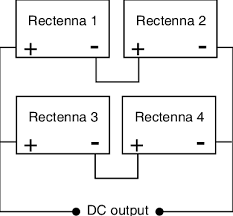Nano Antennas System ( Rectenna Solar Rectenna )
Researcher and author: Dr. ( Afshin Rashid)
Note: Since nano-antennas have the ability to absorb a wide angle, even if the sun is inclined to the surface of the solar panel, their efficiency is maintained to a considerable extent. The system can also absorb energy emitted from the ground, or ground radiation from the sun's daily radiation to the earth's surface, at wavelengths of 10 micrometers , or frequencies of about 90 terahertz.
For this reason, nano-antennas of the solar rectana system can generate electrical energy by collecting this radiation during the night or in bad weather conditions . At present, the diode and antenna structures used in the solar rectum are made using the electronic design method. Although this method of construction is expensive and time consuming to produce on a laboratory and research scale, but if these structures are produced in large volumes and with the appropriate method , they will reduce the cost and speed of the manufacturing process.
It should be noted that Rectenna Rectenna has been studied in recent years, especially in the field of power transmission in the microwave band. For example, in theory, for a single frequency of 9.2 GHz, more than 10% efficiency is predicted . Of course, the practical efficiency of making these devices may be slightly different and must be determined in practice. The dipole antenna with linear polarization and length 2 / λ, which has a relative bandwidth of 11%, will be able to collect about 75.2 pW . With regard to the low received power independent of each antenna, using an array of antibiotics in these cells is customary laws and its own procedures there.Because the use of optical nano-antennas to collect solar energy offers a practical solution that is more efficient than other common photovoltaic technologies such as solar panels, it has led to the rapid development of nanotechnology and optical materials.
Conclusion :
Because nano-antennas have the ability to absorb a wide angle, their efficiency is maintained to a considerable extent even if the sun is inclined to the surface of the solar panel . The system can also absorb energy radiated from the earth, or ground radiation from the sun's daily radiation to the earth's surface, at wavelengths of 10 micrometers , or frequencies of about 90 terahertz.
Researcher and author: Dr. ( Afshin Rashid)
PhD in Nano-Microelectronics





